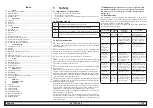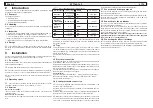
English
2 / 14
ATT140-340
2 Introduction
This manual refers to refrigeration dryers designed to guarantee high
quality in the treatment of compressed air.
2.1 Transport
The packed unit must:
• remain upright;
• be protected against atmospheric agents;
• be protected against impacts.
2.2 Handling
Use a fork-lift truck suitable for the weight to be lifted, avoiding any type
of impact.
2.3 Inspection
• All the units are assembled, wired, charged with refrigerant and oil
and tested under standard operating conditions in the factory;
• on receiving the machine check its condition: immediately notify the
transport company in case of any damage;
• unpack the unit as close as possible to the place of installation.
2.4 Storage
Y
If several units have to stacked, follow the notes given on the pack-
ing. Keep the unit packed in a clean place protected from damp and bad
weather.
3 Installation
For the correct application of the warranty terms, follow the instructions
given in the start-up report, fi ll it and send it back to Seller.
3.1 Procedures
Install the dryer inside, in a clean area protected from direct atmospheric
agents (including sunlight).
Y
Comply with the instructions given in par. 9.2 and 9.3.
Y
The fi lter elements (for 3 micron fi ltration or better) must be replaced
at least once a year, or sooner as per manufacturer recommendations.
Y
Correctly connect the dryer to the compressed air inlet/outlet con-
nections,
3.2 Operating space
Y
Leave adequate clearance around the dryer maintenance opera-
tions and clearance to ensure correct air fl ow. (~ 1,5 m).
3.3 Versions
Air-cooled version (Ac)
Do not create cooling air recirculation situations. Do not obstruct the
ventilation grilles.
Water-cooled version (Wc)
If not provided in the supply, fi t a mesh fi lter on the condensation water
inlet.
Y,
Inlet condensation water characteristics:
Temperature
≥50°F (10°C)
CaCO
3
70-150 ppm
Pressure
43.5-145 PSIg
(3-10 barg)
O
2
<0.1 ppm
PH
7.5-9
Fe
<0.2 ppm
Electrical
conductivity
10-500 μS/cm
NO
3
<2 ppm
Langelier
saturation
index
0-1
HCO
3
-
70-300 ppm
SO
4
2-
<50 ppm
H
2
S
<0.05 ppm
NH
3
<1 ppm
CO
2
<5 ppm
CL
-
<50 ppm
Al
<0.2 ppm
Please note that for special cooling water types such as demineralized,
deionized or distilled it is necessary to contact the manufacturer to verify
which kind of condenser should be used since the standard material
may not be suitable.
3.4 Tips
To prevent damage to the internal parts of the dryer and air compres-
sor, avoid installations where the surrounding air contains solid and/or
gaseous pollutants (e.g. sulphur, ammonia, chlorine and installations in
marine environments).
The ducting of extracted air is not recommended for versions with axial
fans.
3.5 Electrical connection
Use approved cable in conformity with the local laws and regulations
(for minimum cable section, see par. 9.3).
Install a differential thermal magnetic circuit breaker with contact open-
ing distance of 3 mm ahead of the system (RCCB - IDn = 0.3A) (see the
relevant current local regulations).
The nominal current In of the magnetic circuit breaker must be equal to
the FLA with an intervention curve type D.
Phases Monitor
If appears to display the alarm “A41 “, during the start up of the dryer,
the user must verify the wiring of the input terminals of the discon-
necting switch of the dryer.
3.6 Condensate drain connection
Y
The dryer is supplied either with a fl oat drain, a timed drain or an
electronic level sensing drain.
If a timed or electronic unloader is installed, use terminals CN “R1-S1”
(see par. 9.8).
For timed and electronic drains: refer to separate manual supplied with
the dryer for specifi c details concerning the condensate drain.
Y
Make the connection to the draining system, avoiding connection in
a closed circuit shared by other pressurized discharge lines. Check the
correct fl ow of condensate discharges. Dispose of all the condensate in
conformity with current local environmental regulations.
3.7 Connections discharge purge air
The dryer has an air purge connected directly to the unit (or which can be
connected away from the unit).
The extension hose must be rubber with max length 10m (synthetic rub-
ber with inner steel spiral), resistant to temperatures of up to 90° and
pressures up to 10 bar.
3.8 Connection to the air bleeder
To reduce the noise when bleeding air from the tanks, a silencer must be
connected (supplied separately).
The silencer can be connected directly to the unit or away from the unit.
In the latter case, it must be connected using a rubber hose, max length
10m (synthetic rubber with inner steel spiral), resistant to temperatures
of up to 50° and pressures up to 10 bar.
Important: to ensure the correct functioning of the air bleeder, com-
ply with the dimensions indicated for the extension in the appendix
in para. 9.7. (Ø
Int.
= internal diameter)
3.9 Connecting the fi lter oil drainage
The oil residues generated by the fi lter are conveyed through a rilsan
hose (
Ø
8mm), out of the dryer in the point indicated in para. 9.6.
The drainage hose is fi tted with an end coupling so that additional exten-
sions can be fi tted by the user.
Summary of Contents for ATT140
Page 2: ......
Page 16: ...Italiano 14 14 ATT140 340...
Page 30: ...English 14 14 ATT140 340...
Page 44: ...Espa ol 14 14 ATT140 340...
Page 58: ...Deutsch 14 14 ATT140 340...
Page 59: ......
















































